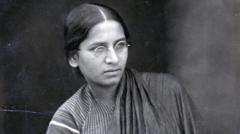In the realm of anthropology, Irawati Karve's life stands as an emblem of resilience and courage. Born in 1905 in British-ruled India, she embraced education and independence at a time when women's roles were largely confined to traditional domesticity. Karve became the first female anthropologist in India, marrying for love and embarking on studies abroad, ultimately achieving groundbreaking insights about Indian culture and society.
Karve's educational journey took her to Berlin in 1927, where she studied under Eugen Fischer, a prominent yet controversial figure known for his eugenics ideologies. While Fischer pushed the narrative of racial superiority, Karve's research contradicted his theories, demonstrating no correlation between skin color and intelligence. Her courageous confrontation of these assertions, despite obtaining the lowest grade for her efforts, laid the groundwork for a critical examination of racial biases and inequalities.
Throughout her career, Irawati challenged societal conventions, engaging with various communities and immersing herself in fieldwork that took her into remote areas of India. In the process, she built bridges of understanding and empathy with tribal populations, often partaking in their traditions—even consuming non-vegetarian food as a symbol of respect and solidarity.
Her work not only advanced anthropological knowledge but also served as a critique of fundamentalism and a call for unity amidst diversity. Karve's profound belief that humanity is interconnected resonated deeply, especially as she reflected on the injustices faced by vulnerable communities globally.
Despite her significant contributions, Karve's groundbreaking legacy remains underappreciated, overshadowed by more prominent figures of her time. A new biography titled *Iru: The Remarkable Life of Irawati Karve*, authored by her granddaughter Urmilla Deshpande and Thiago Pinto Barbosa, aims to illuminate the challenges she overcame and the invaluable lessons her life imparts to future generations.
Irawati Karve's journey—a tapestry woven with threads of intellect, compassion, and originality—continues to inspire contemporary discussions on race, identity, and equality, reminding us that the fight against ignorance and discrimination is far from over. She passed away in 1970, but the ethos of her research and the strength of her character persist in the collective memory and scholarly pursuits of those who strive towards a more just society.
Karve's educational journey took her to Berlin in 1927, where she studied under Eugen Fischer, a prominent yet controversial figure known for his eugenics ideologies. While Fischer pushed the narrative of racial superiority, Karve's research contradicted his theories, demonstrating no correlation between skin color and intelligence. Her courageous confrontation of these assertions, despite obtaining the lowest grade for her efforts, laid the groundwork for a critical examination of racial biases and inequalities.
Throughout her career, Irawati challenged societal conventions, engaging with various communities and immersing herself in fieldwork that took her into remote areas of India. In the process, she built bridges of understanding and empathy with tribal populations, often partaking in their traditions—even consuming non-vegetarian food as a symbol of respect and solidarity.
Her work not only advanced anthropological knowledge but also served as a critique of fundamentalism and a call for unity amidst diversity. Karve's profound belief that humanity is interconnected resonated deeply, especially as she reflected on the injustices faced by vulnerable communities globally.
Despite her significant contributions, Karve's groundbreaking legacy remains underappreciated, overshadowed by more prominent figures of her time. A new biography titled *Iru: The Remarkable Life of Irawati Karve*, authored by her granddaughter Urmilla Deshpande and Thiago Pinto Barbosa, aims to illuminate the challenges she overcame and the invaluable lessons her life imparts to future generations.
Irawati Karve's journey—a tapestry woven with threads of intellect, compassion, and originality—continues to inspire contemporary discussions on race, identity, and equality, reminding us that the fight against ignorance and discrimination is far from over. She passed away in 1970, but the ethos of her research and the strength of her character persist in the collective memory and scholarly pursuits of those who strive towards a more just society.


















